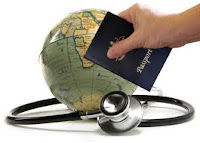
-Anybody traveling out of the country for vacation
-Mission or Humanitarian trip participants
If you are going to visit your country of origin (if not from the US), especially if you have not been there for some time
Individuals who travel out of the country for business
Exchange students
Individuals planning to travel to a significantly higher altitude
Why visit the travel clinic?
People are traveling more and brining disease back into this country and onto planes. Remeber the SARS and Avian Flu surges in the past? Dr. KK and the travel clinic staff are up-to-date on current travel and risk information
Cruises are notorius for repiratory and diarrheal diseases
Prevention of altitute sickness which would, in turn, ruin your trip
Receive specific immunizations to avoid contracting an illness (not prevalent in the US) for the country you are visiting
Receive assistance from Dr. KK about adjusting medications (especially for medications such as insulin) when crossing multiple time zones and the international date line.
The goal of the St. James Travel Clinic, according to Dr. KK, is to "empower you as a traveler so you can be an informed traveler" and minimize travel risks. For those of you who were unable to attend this wonderful presentation, here are a few tidbits that you missed. Use caution on cruises, as they are notorious for respiratory and diarrheal diseases. Swim in pools versus ponds, streams or lakes when you travel to avoid contracting a gastrointestinal or other disease. To reduce risk for hepatitis A and Typhoid Fever, avoid contaminated food and/or water including ice. Re-consider spending money on travel insurance. Ask questions when purchasing, some travel insurance will find and evacuate you should an event such as a hurricane, earthquake or other disaster occur while you are out of the country. Should you fall ill while away, insurance (including Medicare) most likely will not cover out-of-the-country healthcare expenses. Travel insurance often covers such incidents. Schedule your appointment with the Travel Clinic 3 -4 weeks before you travel. Immunizations or pre-vacation medications can take up to 2 week to be effective.
St. James Travel Clinic
http://www.stjameshospital.org/services/travelclinic/
(708) 503-3222